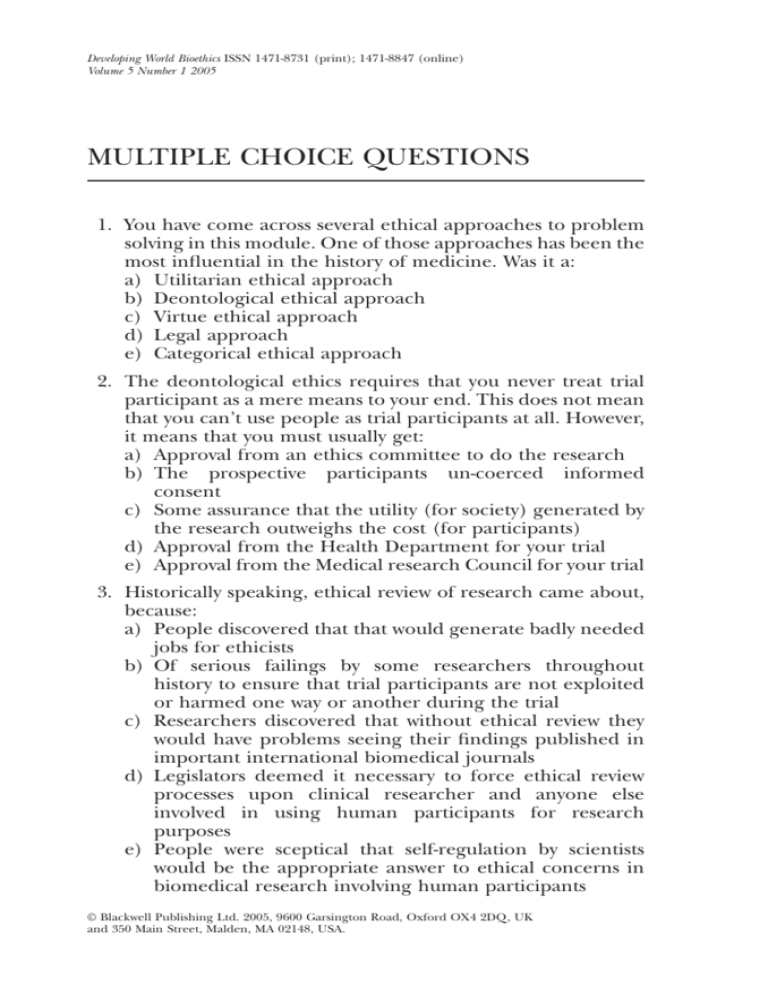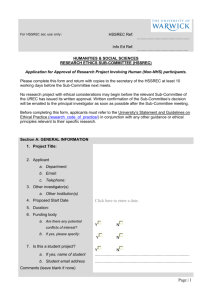multiple choice questions
advertisement

Developing World Bioethics ISSN 1471-8731 (print); 1471-8847 (online) Volume 5 Number 1 2005 MULTIPLE CHOICE QUESTIONS 1. You have come across several ethical approaches to problem solving in this module. One of those approaches has been the most influential in the history of medicine. Was it a: a) Utilitarian ethical approach b) Deontological ethical approach c) Virtue ethical approach d) Legal approach e) Categorical ethical approach 2. The deontological ethics requires that you never treat trial participant as a mere means to your end. This does not mean that you can’t use people as trial participants at all. However, it means that you must usually get: a) Approval from an ethics committee to do the research b) The prospective participants un-coerced informed consent c) Some assurance that the utility (for society) generated by the research outweighs the cost (for participants) d) Approval from the Health Department for your trial e) Approval from the Medical research Council for your trial 3. Historically speaking, ethical review of research came about, because: a) People discovered that that would generate badly needed jobs for ethicists b) Of serious failings by some researchers throughout history to ensure that trial participants are not exploited or harmed one way or another during the trial c) Researchers discovered that without ethical review they would have problems seeing their findings published in important international biomedical journals d) Legislators deemed it necessary to force ethical review processes upon clinical researcher and anyone else involved in using human participants for research purposes e) People were sceptical that self-regulation by scientists would be the appropriate answer to ethical concerns in biomedical research involving human participants © Blackwell Publishing Ltd. 2005, 9600 Garsington Road, Oxford OX4 2DQ, UK and 350 Main Street, Malden, MA 02148, USA. 110 MULTIPLE CHOICE QUESTIONS 4. The historically first international guideline pertaining to research involving human participants was the: a) Declaration of Helsinki b) Declaration of Japan c) Nuremberg Code d) WHO Ethical Guideline e) Set of CIOMS Guidelines 5. The two primary tasks of ethical reasoning are: a) To inform people about the legal situation and historical context as they pertain to their work b) To inform people about what they ought to be doing, and why they should do it c) To ensure that people act ethically and within the boundaries of the law d) To ensure that researchers become good ethicists in their own right and do the right thing by their trial participants e) To guarantee good clinical practice and application of sound clinical methodology during biomedical research 6. Informed consent is important because a) It enables the participant to understand vital information on the proposed trial b) It provides the participant will all the information regarding remote risks c) It enables the investigator to recruit participants of his choice d) It promotes clinical research 7. Informed consent refers to: a) Principle of autonomy b) Voluntary but uninformed decision-making c) A voluntary decision to participate in research, by a competent individual who has received and understood the necessary information d) Permission to participate in research 8. Capacity to consent to trial participation may not be diminished by: a) Poverty b) Source of research funding c) Lack of understanding d) Cultural barriers e) Situational pressure © Blackwell Publishing Ltd. 2005 MULTIPLE CHOICE QUESTIONS 111 9. What gives ethical validity to the procurement informed consent? a) Detailed documentation of the process b) Capacity of the participant to consent c) Quality of the disclosed information d) Quality of the interaction between the prospective participant and the recruiting physician/investigator 10. Which set of the following information need not be disclosed to a prospective participant to procure informed consent? a) All the possible risks associated with participation; possibility of active deception by the investigators; confirmation that the study has an ethics review committee’s approval b) That the study involves research; sources of funding; anticipated benefits and potential risks c) The discomfort that may be associated with participation; the right to withdraw from participation at any stage without reprisals; institutional affiliations of the researcher d) Aims of the trial; methods to be used in the trial; possible conflicts of interest 11. Which set does not represent vital elements of informed consent? a) Capacity to consent; voluntary decision to participate; adequate comprehension of the provided information b) Ability to withdraw from the trial without reprisals; full comprehension of the provided information; documentation of informed consent c) Full disclosure of relevant information; capacity to consent; voluntary decision to participate d) Adequate comprehension of the provided information; capacity to consent; voluntary decision to withdraw from the trial at any stage 12. When is active deception of prospective participants necessary? a) Never b) When no other research method suffices c) When deemed indispensable d) For security reasons 13. Can the requirement for informed consent be waived? a) Yes, at the discretion of the investigator b) No, unless a designated ethics review committee approves © Blackwell Publishing Ltd. 2005 112 MULTIPLE CHOICE QUESTIONS c) Never d) Yes, with the consent of the participant 14. What are some of the hindrances to achieving genuine informed consent internationally and in South Africa? a) Poverty, illiteracy and implicit forms of coercion b) Disease burden, forgetfulness and cultural barriers c) Language barriers, confusion and lack of capacity to consent d) Incentives, situational pressure and health care professionals’ assumed beneficence 15. Who cannot consent to trial participation in South Africa? a) Healthy but poverty stricken volunteers b) Healthy volunteers below the age of 18 c) Mentally stable but sick adults d) Medical students 16. When is assent mandatory in procuring informed consent? a) When the prospective participant is a minor b) When the prospective participant is unconscious c) When the prospective participant has a mental disability d) When the prospective participant is a mature minor who is capable of making appropriate decisions about trial participation 17. Who gives consent in cases of minors who have no parents or guardians? a) Consent can be waived, as it is not necessary b) Nobody c) A social worker d) Legal guardians 18. Which of the following scenarios may lead to role confusion in participant recruitment? a) Recruitment by community leaders b) Recruitment by a trial investigator c) Recruitment by the participants’ relations d) Recruitment by an investigator who is also a physician who has been providing medical care to the prospective participant 19. When does a community leader’s authorisation of participants’ recruitment replace an individual participant’s consent? a) Never b) When the community’s interests are at stake © Blackwell Publishing Ltd. 2005 MULTIPLE CHOICE QUESTIONS 113 c) When the proposed trial is likely to benefit the community d) Always 20. What role does a community/local leader’s authorisation play in the recruitment of participants? a) It gives the proposed trial ethical validity b) It fosters respect for the local customs and expectations c) It ensures that the community members volunteer in large numbers d) It plays no role 21. Vulnerable populations are those best characterised as: a) relatively poor persons b) persons experiencing emotional distress c) non-citizen residents of a foreign country d) persons who stand in severely unequal power relationships with others e) persons who are mentally incompetent 22. Prisoners are considered a vulnerable population for each of the following reasons except for: a) the fact that their incarcerated status places them in unequal power relationships b) the fact that prisoners are easily influenced by rewards and incentives c) the fact that prisoners can never give informed consent under any circumstances d) the fact that prisoners may have very options to distinguish themselves from others e) the fact that prison guards may mistreat prisoners who do not choose to participate in research studies 23. Clinical research involving refugees is: a) relatively unregulated with few ethical guidelines directly addressing refugees as a vulnerable population b) relatively regulated with most ethical guidelines addressing refugees as a vulnerable population. c) more ethically acceptable than research on prisoners d) less ethically acceptable than research on mentally incompetent adults e) always sufficiently reviewed by the appropriate host country authorities 24. When conducting clinical research involving impoverished persons of developing world countries, perverse incentives must often be balanced against: © Blackwell Publishing Ltd. 2005 114 MULTIPLE CHOICE QUESTIONS a) b) c) d) e) placebo arms of clinical trials the need for more money in local communities absolute standards of care cultural attitudes toward reciprocity the propensity of incentives to unduly influence decision making and pre-empt informed consent 25. The World Medical Association ethical guidelines were first formulated under the: a) the Nuremberg Code b) the CIOMS International Ethical Guidelines for Biomedical Research c) the Declaration of Helsinki d) the Council of Trent e) the Tuskegee syphilis study 26. Mentally incompetent persons: a) cannot rely on proxies to give informed consent b) should not participate in clinical research according the Nuremberg Code c) should not participate in clinical research according to the Declaration of Helsinki d) can only ethically participate in non-therapeutic research e) were the primary subject of controversy during the Tuskegee syphilis study 27. Research involving vulnerable populations must always: a) leave the participants better off than they were before b) address questions that cannot be answered by conducting research on other, non-vulnerable populations c) follow local standards of care d) involve participants residing in developing world countries e) secure informed consent (directly or by proxy) from research participants 28. The ACTG 076 protocol: a) is the name of the short-course of zidovudine standardly available in developing countries b) is 99% effective in the prevention of mother to child transmission of HIV c) involves an experimental microbicide d) was the ‘best proven’ treatment for the prevention of mother to child transmission of HIV in 1994 e) was tested against placebo in clinical trials which took place in developing countries in 1994 © Blackwell Publishing Ltd. 2005 MULTIPLE CHOICE QUESTIONS 115 29. Defenders of the ethical acceptability of placebo-controlled clinical trials of the short-course of zidovudine for prevention of perinatal HIV transmission in developing countries argued that: a) Declaration of Helsinki requirements concerning control arms were appropriate and should be preserved b) Declaration of Helsinki requirements concerning control arms were inappropriate and should be changed c) placebo-controlled studies take longer and require larger numbers of research participants d) human participants in control arms should always receive the ‘best proven’ therapeutic method e) Declaration of Helsinki requirements regarding informed consent were too demanding and should be loosened 30. Critics of the ethical acceptability of placebo-controlled clinical trials of the short-course of zidovudine for prevention of perinatal HIV transmission in developing countries argued that: a) placebo controlled studies are never morally acceptable b) the ACTG 076 protocol was generally affordable in developing countries c) double standards are appropriate because the ACTG 076 protocol was not affordable in developing countries d) Declaration of Helsinki requirements should be weakened e) historical controls would have sufficed 31. Defenders of the ethical acceptability of placebo-controlled clinical trials of the short-course of zidovudine for prevention of perinatal HIV transmission in developing countries argued that: a) placebo control is always morally acceptable b) placebo control was necessary to determine the relative efficacy of the short-course of zidovudine c) developing world patient-participants would be harmed if they were denied the ‘best proven’ treatment for the prevention of mother-to-child transmission of HIV d) patient-participants who received placebo would not be harmed e) informed consent is a sufficient condition for the moral acceptability of research involving human participants 32. Schüklenk argues that: a) the answers to ethical questions should be determined by economic criteria © Blackwell Publishing Ltd. 2005 116 MULTIPLE CHOICE QUESTIONS b) the ACTG 076 protocol is in fact ineffective c) in research on human participants, the interest of science and society should always take precedence over considerations related to the well-being of the subject d) the Tuskegee syphilis studies were morally unproblematic e) local standards of care are in fact determined by prices set by drug companies 33. The Declaration of Helsinki is a document of: a) The American Medical Association b) The Helsinki Health Institution c) The World Health Organization d) The World Medical Association e) The Federal Drug Administration 34. The current version of the Declaration of Helsinki states that control arm participants should (generally) receive: a) the ‘best current’ treatment b) the ‘best proven’ treatment c) the ‘best locally available’ treatment d) ‘no treatment’ e) proven effective’ treatment 35. The latest version of the Declaration of Helsinki explicitly states that: a) all participants involved in studies related to HIV should be provided with HAART at the conclusion of the study b) those who become infected with HIV during the course of vaccine trials should be provided with HAART at the conclusion of the study c) it is unnecessary to provide condoms and counseling to participants in microbicide trials d) medical experiments are ethically justified so long as their results are likely to benefit the world population e) every patient entered into a study should be assured of access to the best proven prophylactic, diagnostic, and therapeutic methods identified by the study 36. CIOMS/WHO guidelines require that control arm participants generally receive: a) the best current method b) the best locally available method c) historical control d) an established effective intervention e) coercion © Blackwell Publishing Ltd. 2005 MULTIPLE CHOICE QUESTIONS 117 37. According to Department of Health guidelines in South Africa, a) it may be justifiable to use placebo in communities that do not have access to interventions that are the standard care in resource-rich settings b) placebo control should never be considered ethically acceptable c) informed consent is a sufficient condition for the moral acceptability of research involving human participants d) informed consent is unnecessary so long as there are good reasons to believe that both the individuals involved and the community as a whole are likely to benefit from research participation e) it is inevitable that drug trials will often prejudice the ongoing treatment and care of patients 38. The following documents must be made available to the REC for review prior to trial approval: a) trial protocol b) written informed consent forms c) information on serious adverse events from the Data Safety and Monitoring Board (F) d) declaration of conflict of interest of the researcher where appropriate e) participant recruitment procedures 39. Acceptable recompense for trial participation includes: a) reimbursement for transport b) reimbursement for lost earnings c) extensive medical services d) reimbursement for inconvenience and time spent as a result of their participation in research e) free medical services either related or unrelated to research participation 40. According to the WHO guidelines for ethics review, RECs must be constituted and perform according to the following principles for ethical review: a) independence b) competence c) pluralism d) transparency e) scientific integrity © Blackwell Publishing Ltd. 2005 118 MULTIPLE CHOICE QUESTIONS 41. Scientific misconduct refers to a) a researcher accidentally misquoting his or her data b) fabrication, falsification, plagiarism, or some other deviation from what is commonly accepted by the scientific community c) failure to achieve expected results d) accidental failure to cite a source 42. Which of the following are susceptible to conflicts of interest? a) authors b) researchers c) editors d) all of the above 43. If a researcher finds himself in a situation where he or she has a conflict of interest he or she should not do which of the following a) disclose the information to his research participants b) keep the information to himself or herself so as to not to frighten the participants c) disclose the information to the medical journal to which he will submit the data d) avoid such conflicts in the future 44. Which of the following scenarios is likely lead to generate conflicts of interest? a) recruitment of researchers by a university b) recruitment of researchers by a medical journal c) recruitment of researchers by a drug company d) government recruitment of researchers 45. Plagiarism refers to which of the following? a) copying verbatim and without citing the source b) stealing the intellectual property of someone else without citing the source c) using the examples from another paper but mixing up the order so it is unrecognisable d) all of the above 46. Which of the following is not one of the necessary conditions for authorship as given in the Vancouver Guidelines of the ICMJE? a) substantial contribution to conception and design, or acquisition of data, or analysis and interpretations of data © Blackwell Publishing Ltd. 2005 MULTIPLE CHOICE QUESTIONS 119 b) acquisition of essential funding required to undertake the research c) drafting the article or revising it critically for important intellectual content d) final approval of the version to be published 47. To be considered an author, one must fulfil how many of the three authorship criteria according to the ICMJE? a) 1 b) 2 c) 3 d) None 48. Under what circumstances, if any, is secondary publication acceptable? a) if it is published in a different journal than the first publication b) if the paper is intended for a different group of readers c) if no one will recognise the paper from its first publication d) if the author wishes to publish it again © Blackwell Publishing Ltd. 2005







